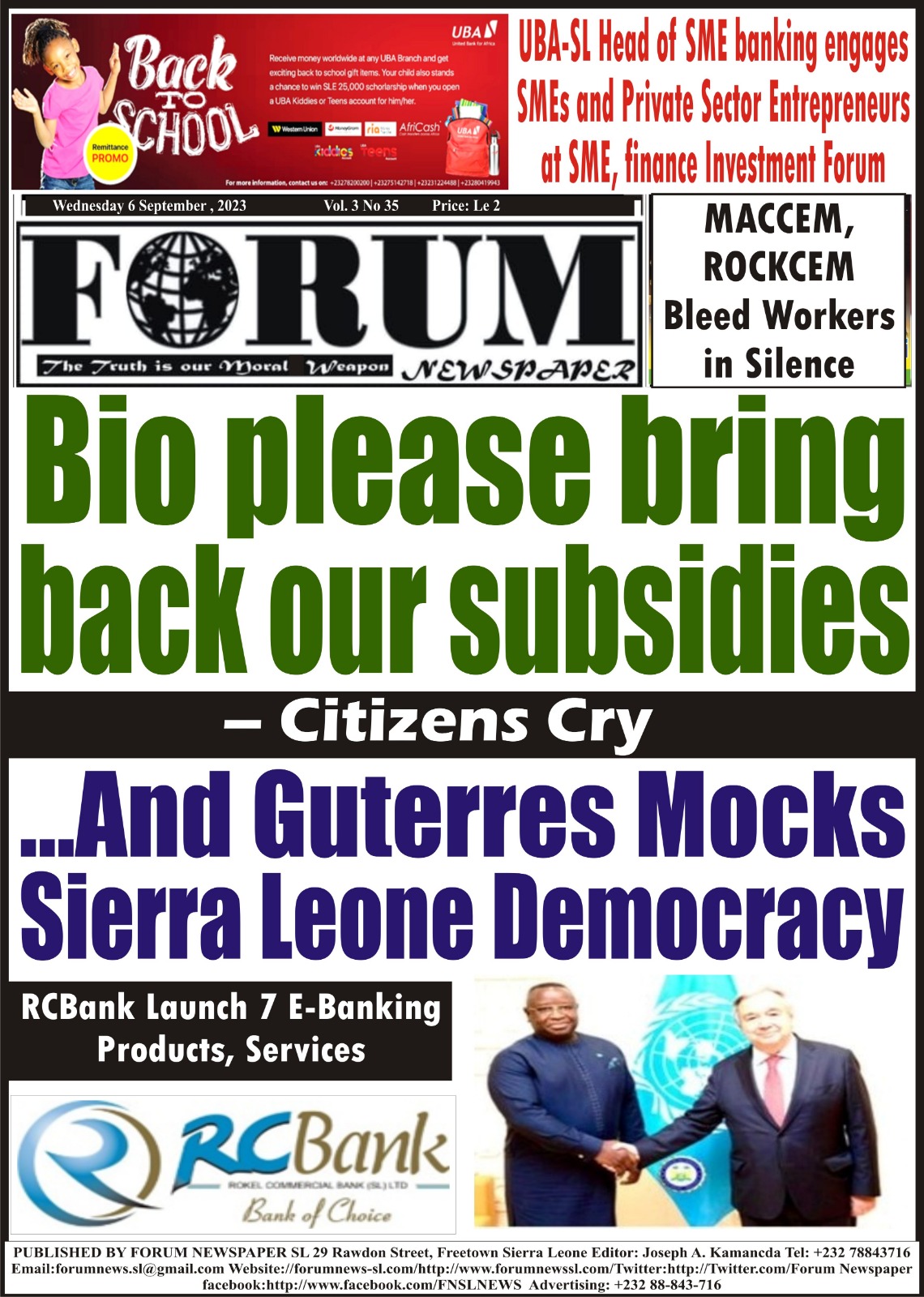Less than two months after the electoral commissioner for Sierra Leone, Mohamed K. Konneh announced that president Julius Maada Bio “won” his second term “mandate” to be president of the nation, the price of goods and services continue to rise, giving credence to the projection that re-electing Bio for a second term mandate would result to untold assaults on the prices of goods and services that would make our experiences during his first term a walk in the park.
As if on cue, the price of fuel, which is not controlled by factors inside Sierra Leone, has risen twice since 24 June 2023. The price of the black gold first rose to Le21.50 per litre not long after the 24 June election, to everyone’s consternation.  The people say that the rises in the fuel pump price reminded them of the warning that re-electing Bio would result to untold sufferings.
The people say that the rises in the fuel pump price reminded them of the warning that re-electing Bio would result to untold sufferings.
‘This term has not gone anywhere as yet and we have already had two hikes in the price of fuel since 24 June. Is this Bio’s fault? Yes. It is his fault because as leader he is to ensure that the nation maintains a strategic stock of goods and services that we don’t produce. This is called a reserve. Where is Sierra Leone’s fuel reserve? How about our reserve for food? Are we considering that the prices of other strategic goods and services could rise? What plans do we have if and when they also start going up?’ asked a concerned citizen.
Today, the price for a litre of petrol is Le30, to the irritation of the people that said they did not vote for president Bio.
Since the price of fuel inadvertently affects many other prices, including those of locally produced goods that many say should not fall victim to the fluctuations in the international price market, the struggling people of Sierra Leone have called on the government to bring back fuel subsidies to offset their burdens caused by the two recent hikes in the price of fuel.
Per definition, a subsidy typically supports particular sectors of a nation’s economy. It can assist struggling industries by lowering the burdens placed on them or encourage new developments by providing financial support for their endeavours.
A member of the struggling SLPP government said governments seek to implement subsidies to encourage production and consumption in specific industries.
‘When government subsidies are implemented to the supplier, an industry is able to allow its producers to produce more goods and services. This increases the overall supply of that good or service, which increases the quantity demanded of that good or service and lowers the overall price of the good or service,’ we were told by an anonymous oil marketer.
Since we don’t produce fuel, the people’s experience is made worse when the pump price goes up, as there is no way for the people to reset their prices using local applications since the nation is not a net producer of petrol.
While many industries receive government subsidies, three of the biggest beneficiaries are energy (fuel products), agriculture (foodstuff), and transportation (fare).
‘Sierra Leone finds itself in a horrible bind. The price of fuel keeps going up and the US dollar keeps gaining against the weak leone that is not capable of gaining on the dollar without huge cash injections into our economy by our donors or supporters. At present we do not have any donor support coming into the country due to such agencies or governments not recognising how our leader “won” his presidential elections. Although we are demanding fuel subsidy, we do not see how this will benefit us in the long run if we are not producing our own food, fuel or vehicles,’ said a fuel importer who also spoke on condition of anonymity.
He said when the government gives subsidies to the supplier, what results is a win-win situation for both the supplier and the consumer. Essentially, the supplier is benefitting as if the good were selling at a higher price and is able to produce more of the product. Meanwhile, consumers get to enjoy the product for what would be a comparatively cheaper price, since suppliers do not need to charge exorbitant rates to break even on production.
Since the government helps suppliers through tax credits or reimbursements, the lower overall price of their goods and services is more than offset by the savings they receive.
‘On the consumer side, government subsidies can help potential consumers with the cost of a good or service, usually through tax credits. For example, a great example of this is the current transition to more renewable sources of energy. With still nascent models of green economics, the current demand to purchase new energy-saving technology is low. In order to sway consumer interest, government subsidies or tax credits can help with this high cost of adoption. When Sierra Leone grows to where consumers refit their houses with solar panels, the government will provide a tax credit to individuals and families to offset the high price of purchasing the new solar panels.’
In this sense, he said consumer-targeted subsidies will not necessarily increase supply, ‘since producers aren’t being motivated or compensated to produce more’ he added.
‘However, tax credits will offset higher prices for consumers so that the margin still goes back to producers,’ he went on.
He concluded by clarifying that direct subsidies involve cash transfers or tax breaks that immediately impact a company or industry.
‘Indirect subsidies do not have a specific cash value or involve payments of cash. These can instead include making it easier to obtain inputs or reducing costs in other ways,’ he noted.
It must be noted that although subsidies are known for restoring both consumer and producer confidence, however one aspect that has been militating against Sierra Leone maintaining lower prices that would not necessitate the need for subsidies is the routine demand by the IMF and other lending agencies insisting on their debtors raising local taxes to offset debts. This can negatively impact on a government’s subsidy regime.
What remains to be seen is how this embattled government regime will be able to scale this potential problem international economic forces have brought on our doorsteps without government earning enough to offset incurred costs from subsidies.










